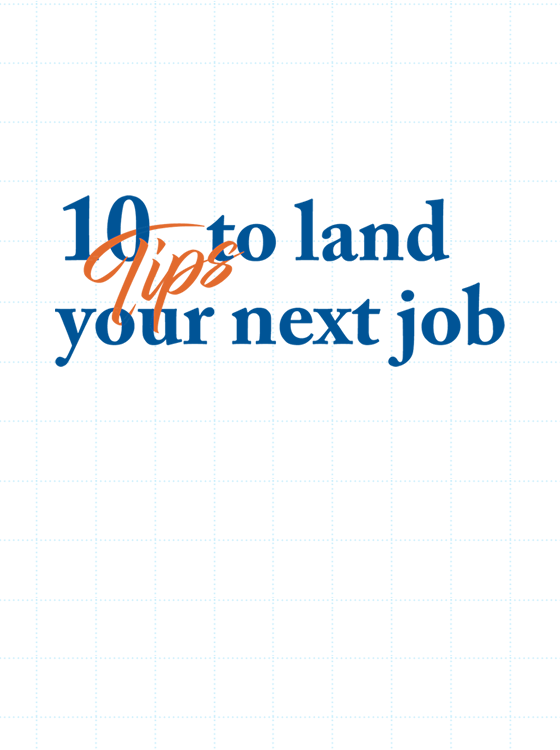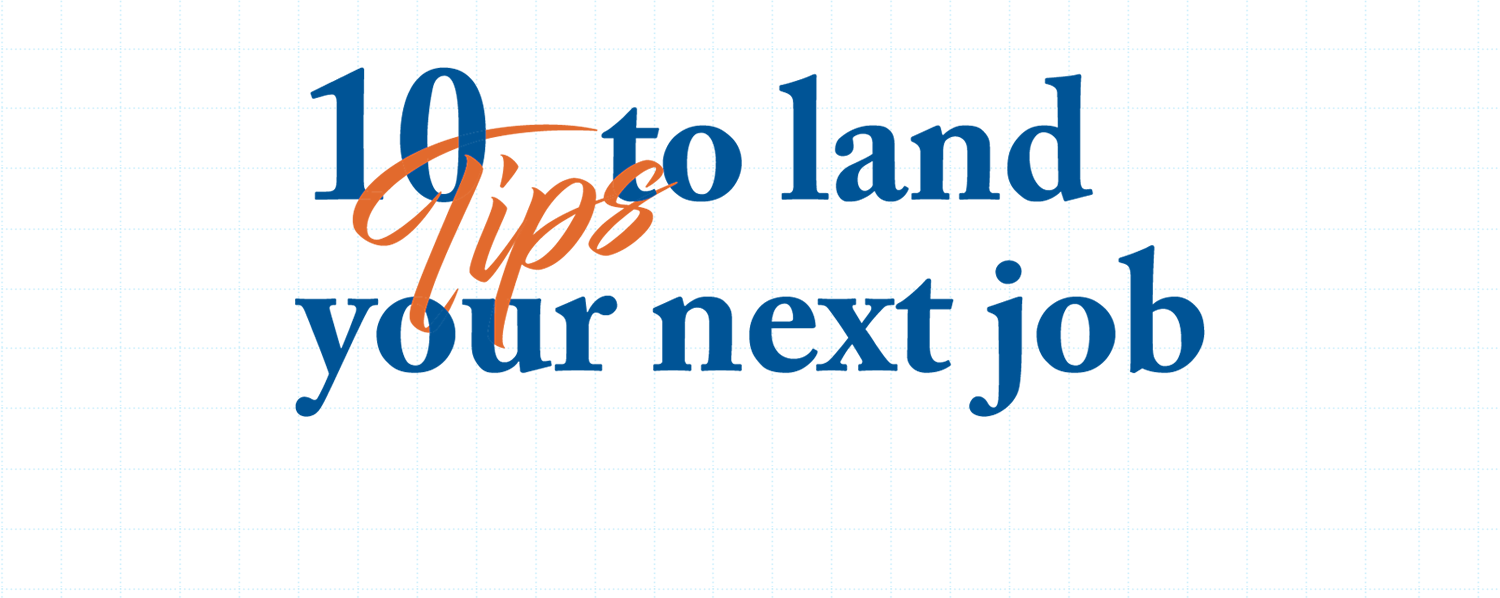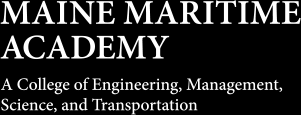If you want your career choices to lead to the best possible job, here’s a method to follow, provided by the staff of MMA’s Career Services office and other experts.
1Position yourself for opportunities.
“Many MMA alumni are CEOs and leaders in the maritime and other industries,” says Capt. Joe Curtis ’97, Director of Career Services, “and what you see in common is they spent their time in the trenches but were always positioning themselves for the next opportunity.”
It’s easy for a job and life responsibilities to swallow your time and energy, but attaining additional certification, training, and experience beyond your current job description is key to the success of pursuing new opportunities. Curtis says most of those who succeed consider themselves “lifelong learners.”
If you’re a second mate looking to become chief mate, you need not only to maintain your certifications, gain sea time, and study for the next level license, but also to take the initiative to attain experience related to the more advanced position.
“Set yourself apart,” says Jim Peacock, career development specialist and owner of Peak-Careers. “Look for leadership opportunities within your company that get you outside your comfort zone, through work on a committee or special project.
“You’ll be involved with a different set of people who have other views of your industry. That’s where serendipity can happen, providing opportunities that you might not otherwise realize.”
Join professional organizations and community and volunteer efforts that “show you give a little bit extra versus others with comparable job experience,” says Curtis.
“If I’m hiring, I take note of people who are engaged and involved in things outside their day-to-day job.”
2Pick the best job match for you.
Curtis urges job seekers to think beyond the objective of going after a job with an attractive title and pay.
“Consider three to five years down the road,” he says. “A lesser-paying job may provide you with the experience to, say, meet your long-term goals, versus a comparable job for more pay.”
Prioritize. “Consider what’s most important to you,” says Curtis. “Is the money important? Is time on your license important? Is the time on and off important? Advancement opportunities?”
Analyze job postings and note the career tracks others have taken to attain similar positions. One of the best tools is LinkedIn.com, the world’s largest professional network and career database. You can search for jobs, identify contacts at employers who are advertising vacancies, follow companies of interest, and more.
3Do your homework.
When you’ve chosen the jobs of most interest to you, narrow down the companies offering such positions to a half-dozen or so, says Curtis.
“Then, give Career Services a call, and we can help identify MMA alumni or other useful contacts at those companies.”
Look on each company’s website to see if a position is listed. If so, carefully study the job description, taking note of keywords. Research the company’s operation, mission, and values.
If you have contacts at the company, reach out to them to informally learn more.
Determine who the key players are in the company. Start with the CEO or president, then managers and department heads. Usually, you can find professional bios on the company’s “About” page. Also, check on LinkedIn and Twitter to see what employees say about the company. Determine who the company’s clients are and the types of products and services offered. On websites such as Glassdoor, you’ll find information such as salary figures, employee functions and duties, and company reviews.
4Invest in your résumé.
Before you apply for a job, prepare your professional documents, including a record of all certificates and classes you have completed. “It’s good to have one up-to-date generic résumé with just about everything you’ve ever done on it,” says Curtis. Then prepare an industry-specific résumé. From a well-prepared industry résumé you can then work on making your résumé both company- and position-specific.
“Employers are known to trust referrals faster. So, making connections in your field can present opportunities that aren’t publicly available online.”
Your position-specific résumé can be placed on job websites and describes your place in the industry as an engineer, second mate, or manager, as well as what makes you unique and valuable.
If you’re aiming for a specific job, prepare a résumé that is tailored to fit the requirements of the job description.
“I advise job hunters to print the job description, highlight all the keywords, and make sure they are reflected in their résumé,” says Curtis. “For example, if it says ‘safety-oriented,’ make sure that is in your résumé. If it says ‘valid driver’s license required,’ put that on your résumé.”
The need for the matchup is dictated by the current trend to use computers to scan and sort qualified candidates from vast fields of applicants. According to jobscan.com, 90% of large companies use applicant tracking systems to filter pools of applicants.
Also, while you’re at it, make sure you have an up-to-date profile listed on LinkedIn, which Curtis says more and more hiring professionals are referencing.
Your résumé should show how you have added value to your job. “To stand out, describe how you solved problems or communicated with various audiences (executives, supervisors, team members, customers). These are skills that are just as important as technical skills,” says Steph Cartwright, Certified Professional Résumé Writer and Founder at Off the Clock Resumes.
“Describe your contributions to past projects in the workplace. Giving your skills context showcases how you applied them to meet goals and will help you land a job over others who list skills alone on their résumé and LinkedIn profiles.”
“Being able to say I saved a company $2 million, for example, will get you noticed,” says Curtis. “Did you revamp the safety management system and reduce injuries in the company? These accomplishments are important. Describe what you have done that goes above and beyond doing your job.”
A cover letter that is concise should also, like your résumé, tell the employer about your value in the context of the employer’s needs and job requirements.
Additional résumé tip: Have lots of eyes proofread your résumé. Don’t let a simple mistake knock you out of the running.
5Understand the hiring process.
Curtis recounts how one experienced recruiter said, “If I don’t know within the first 6-8 seconds of looking at your résumé who you are, what you’re applying for, what value you’re going to add to the position, and that you have all the certification, license, and degree requirements, then it goes into the circular file.” Communicating, showing, and knowing your value to a potential employer is essential. Always consider who is reading your résumé and supporting documents.
“An example of how a recruiter might use LinkedIn,” says Peacock, “is if, say, they are looking for an engineer, they do a search stipulating specific requirements of three years of experience, area of expertise, such as hydraulics, and the five or six other essential components of a position.
The site will search through thousands of profiles in minutes and serve up results. The recruiter then will narrow that set of results down to about 10 profiles using keyword matches and criteria previously listed.”
If you make it to the initial pool of candidates, Curtis says, many companies are now whittling down that pool through phone interviews and web-based or video-conference interviews.
6Build your networks.
Not every job available is posted online. The majority of jobs, especially those with smaller companies, are not advertised, say experts.
“Employers are known to trust and hire referrals faster,” says Cartwright. “So, making connections in your field can present opportunities that aren’t publicly available online.”
“I see too many people spending 80% of their time on job boards applying for hundreds of advertised jobs,” says Peacock. “You should spend 80% of your time talking to people and networking. The biggest mistake I see is that people don’t pick up the phone enough.”
The phrase “It’s who you know that counts” couldn’t be more important. It’s likely that thousands of MMA graduates have found employment with the help of other alumni.
One of the most substantial assets you possess as an MMA alum is a network of classmates and other graduates, reaching back more than 75 years, that comes with your association with Maine Maritime.
“Your efforts should begin with the MMA network,” says Peacock.
“It is the friendliest network. It might seem like you’re making a cold call to reach out to alumni other than those whom you know, but it’s a ‘warm’ call. When you call or email, you can say: ‘I’m an MMA alum and I see that you are too. Could you give me 10 minutes of your time?’”
Think of your alumni network and those you know personally as your primary network. Work through these contacts and sites like LinkedIn to build your secondary network.
“My primary network on LinkedIn is around 2,000 people,” says Curtis, “but the secondary network I can access via them is thousands more. Consider this your passive network.”
Other networking help can be obtained via MMA Career Services; Curtis also suggests checking out alumni chapters in your area.
7Follow up.
One of the most common mistakes Curtis observes is that job applicants apply online, and then they leave it at that.
Follow up one to two weeks after applying. Find the hiring manager’s contact information and write a personalized email. You might also call the company and affirm they’ve received your application.
Being persistent shows that you are interested in a position or company.
8Make the most of social media.
“LinkedIn is a fantastic social media tool for making alumni connections,” says Cartwright. “The platform was designed to allow you to introduce yourself to others in your field.
“When sending a connection request, add a personalized note to your query,” says Cartwright. “Otherwise, the alum may ignore the request since he or she doesn’t know you. Briefly introduce yourself, share that you’re an MMA alum, and indicate you’re interested in working for his or her company.
To encourage a response, ask a question about the company culture or hiring process. The goal is to continue the conversation and develop a networking relationship.”
In your own LinkedIn profile, be sure to list your personal e-mail and phone number. Do not rely on the default LinkedIn messanger system because “many people aren’t aware of it, and others don’t check it on a regular basis,” Peacock says.
Let people know you are looking via your Facebook and Twitter posts. Facebook can be useful because friends who know you personally have more of a stake in helping you.
However, make sure your Facebook profile is private; choose “Friends Only” in settings so that potential employers will not see your personal profile, photos, or status updates.
“Hiring professionals do their homework when narrowing their final search,” says Curtis, “so be mindful of what you are sharing in the public domain. It could affect your chances of being hired.”
Facebook’s “List” feature allows you to continue building your network without worrying about professional contacts seeing your personal updates. Under Account, then Friends, create a new list and customize your privacy settings so professional friends can only look at what you want them to see. That way, your close friends can still keep up with your photos and updates.
Also, join industry-related conversations on LinkedIn and Twitter.
9Ace the interview.
From your initial research, you should be familiar with a company in case you are contacted for an interview, but make an extra effort at this point to learn more, and be prepared to articulate this knowledge during the interview.
Be able to concisely describe your selling points, how you can add value, and the reasons you are the best candidate for the job.
Prepare for common interview questions: “Tell me a bit about you” is a perfect opportunity to explain the main reasons the company should hire you. Be prepared to answer other typical questions such as, “Why do you want this job?” and “Tell me about your strengths and weaknesses?” (Do a quick online search to find other typical questions.)
Prepare your questions for the interviewer. These questions will indicate you’ve done your homework, and they will help you decide if the job is a good fit.
Be able to concisely describe your selling points, how you can add value to the company, and the reasons you are the best candidate for the job.
Practice: Find willing friends or associates who will help you conduct a mock interview.
Approach the interview—and the hiring process— with energy and enthusiasm. Also, an interview in not an interrogation. Be comfortable and have a conversation with the interviewer. Being comfortable and confident is as important as the answers you give.
“Your perspective and attitude are essential elements of job hunting,” says Cartwright. “Your résumé isn’t about you. Your interview answers aren’t about you. Instead, adopt the employer’s perspective. Demonstrate that you understand the goals of the role you’re applying for as well as the company’s priorities.”
“Your attitude will show in every aspect of your job search. When you don’t target your résumé, your résumé shows an I-don’t-care attitude. If your energy in an interview is lacking, you project a negative attitude that repels employers rather than attracting them.”
10Anticipate significant transitions in your career.
During the course of your career, there will likely be opportunities and changes that can propel you onto unanticipated paths. Think of MMA classmates who may have started as engineers or deck officers but became successful financiers, aviators, or entrepreneurs.
“MMA prepared you with an excellent skill set,” says Curtis. “That skillset is transferable to a huge number of opportunities and industries.”
The more connected you are to your network of professionals, the more possibilities will become apparent, as long as you keep an open mind and have the confidence to open new doors.
Contact MMA Career Services at 207-326-2276 or career@mma.edu.█






Post Comment
Thank you for this wonderful article. I am currently writing research on “The role of the internet on job search and acquisition”. While I was browsing online, I found your article. It was really helpful to me. I picked some ideas here and I will reference it properly in my paper. Thanks for sharing!
Comments are moderated and will be reviewed prior to posting online. Please be aware that when you submit a comment, you agree to the following rules:
Maine Maritime Academy reserves the right to delete any comment that does not comply with these guidelines and is not responsible or liable in any way for comments posted by its users. If you have a message for the editor, please email mariner@mma.edu.
Features
View All >Read More
Read More